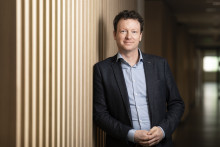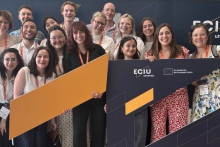eciu university
The ECIU University is a new European university involving twelve ECIU (European Consortium of Innovative Universities) partners, including the University of Twente which coordinates the project. It aims to develop a virtual university based on challenge-based education, research and innovation. Multidisciplinary teams of learners (students and professionals) will work on real life societal challenges combined with online micro modules. The pilot project, funded by the EU Erasmus+ programme, was officially launched in November 2019 and is scheduled to last three years, after which the partners plan to continue to run the ECIU University based on business plan that is now being developed.
It is now a year since the official launch. What has happened with the ECIU University so far?
Lotze: ‘Corona happened of course. That has had a major impact on how the project is running. It’s difficult to run a project that relies on an international network of universities without any physical meetings. That certainly didn’t make it easier, but I’m surprised at what we managed to accomplish. In fact, we have agreed on our vision for 2030. We don’t call the ECIU University a project anymore, it’s a process towards a new European university.’
ECIU University has been called an experiment. Can we still call it that?
‘The word experiment is still definitely accurate. We know what we want to create – we want to move towards a virtual agora, where we can connect digitally and physically, a sort of a floating universe – but how to get there is still an experiment.’
How will the university work in practice? How can people sign up and what can they expect?
‘We have focused on creating challenge-based education available to students from all ECIU partner universities. We have now come up with 23 challenges, which are online and open for students to sign up. The challenges are designed and hosted by all the partners; the UT is in charge of two of them: ‘Resilient communities for healthy living’ and ‘Creating societal business models for new energy gardens’. Students can choose the challenge that interests them the most and register. In the coming months we will be forming diverse teams that will start working on the challenges in February. We are aiming for 300 students for this first round, keeping it small on purpose. For now, only students can participate but options for life-long learners will be added soon. They should be able to sign up for the next phase in September 2021.’
What will ‘solving a challenge’ involve?
‘Each team will get an assigned teacher who will guide them. It will be up to the teachers to coach the team during the learning journey. Right now participating is an extracurricular activity. We are aiming to give 4-6 ECTS for participation, but it will differ per university. Right now there is the Autumn Challenge taking place. This Autumn Challenge is sort of a pilot run for the ECIU University education and we will be using the experience to set everything up.’
Will the teams be working together virtually?
‘Yes, that is the plan for now. In fact, we are working on a virtual reality learning environment. Our partner university in Tampere is developing an online environment, where learners could meet their team in VR. It is quite amazing. You can simply walk around a green campus, enter courses and talk to your team members – while still at home or anywhere else.’
What else is on the agenda for the ECIU University?
‘We just received an additional two million euros funding for a new virtual research institute called SMARTER. This project should start up in February 2021. It will be run under the ECIU University and also led by the UT. On top of that, we are of course working on a new European personalized degree pathway. It will be different from everything people know. It will not be a joint degree, it will be a completely new type of a European degree. As a learner, you will be guided by artificial intelligence and decide exactly which challenges and micro courses suit you. The learning pathway will be completely personalized to you and your skills and knowledge. And at the end of it there will be a degree – or, as I prefer to call it, a European passport. We plan to implement this within two years.’
Do you think this is the future of education?
‘Those are big words. I think we can do a lot more in education in order to keep people up to date in their competencies. We need a life-long place where you come back to, hence the ECIU University and its members. We need to dare and try new things. In general, this project is a push for innovation, but it would be too much to say ‘this is the future of education’. It should become an international community of people where you work on societal challenges and learn while doing it. We don’t aim to replace existing universities, but to add a hybrid university which is intertwined with ours.’







